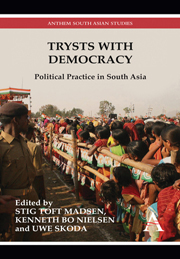Book contents
- Frontmatter
- Contents
- List of Tables
- List of Abbreviations
- Glossary
- Map of South Asia
- Acknowledgements
- 1 Introduction
- Part One Theoretical Issues
- 2 Why did India Become a Democracy and Why did it Remain Democratic? A Survey of the Literature and Some Comments to the Scholarly Debate
- 3 Democracy in Bangladesh: A Village View
- Part Two India
- Part Three Beyond India
- About the Editors
- About the Contributors
2 - Why did India Become a Democracy and Why did it Remain Democratic? A Survey of the Literature and Some Comments to the Scholarly Debate
from Part One - Theoretical Issues
Published online by Cambridge University Press: 05 March 2012
- Frontmatter
- Contents
- List of Tables
- List of Abbreviations
- Glossary
- Map of South Asia
- Acknowledgements
- 1 Introduction
- Part One Theoretical Issues
- 2 Why did India Become a Democracy and Why did it Remain Democratic? A Survey of the Literature and Some Comments to the Scholarly Debate
- 3 Democracy in Bangladesh: A Village View
- Part Two India
- Part Three Beyond India
- About the Editors
- About the Contributors
Summary
Introduction
The nature of political regimes in South Asia has always constituted a puzzle within the political science discipline. In particular, the emergence and consolidation of a democratic regime in India situated in a region with culturally similar countries dominated by mostly non-democratic regimes has been difficult to explain using the standard explanatory factors from different strands of democratic theory. India is either being seen as being too poor, too illiterate, socially and culturally too traditional and ethnically too fragmented to be a likely candidate for a stable parliamentary democracy. In comparison, political developments in Pakistan, Bangladesh or Sri Lanka have been in much greater conformity with the standard prescriptions of the prevailing theories of preconditions for parliamentary democracies.
In this chapter I will give an overview of some prominent academic positions in two related but nevertheless distinct debates. The first debate concerns the background for India's democracy and tries to answer one of the great intellectual puzzles within the social sciences: Why did India end up having a democratic political system? The survey of the relatively few contributions to this academic debate will be followed by some critical observations and some reflections on the different answers given over the years to this question.
The second and much more unwieldy debate concerns the question of why the democratic political system, once established – and unlike the situation of most other newly independent poor countries – has persisted in India despite the many and varied challenges it has encountered in the post-Independence period.
- Type
- Chapter
- Information
- Trysts with DemocracyPolitical Practice in South Asia, pp. 19 - 44Publisher: Anthem PressPrint publication year: 2011
- 1
- Cited by



